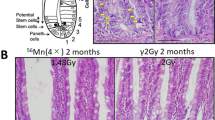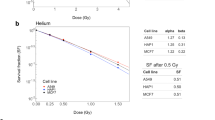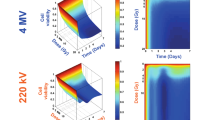Abstract
OBSERVATIONS were reported recently1,2 on a significant reduction of the extrapolation number of the survival curves of mammalian cell cultures which were exposed in vitro to varying X-ray doses under anoxic, as contrasted to aerobic, conditions. In view of the relationship between the extrapolation number and the extent of recovery from radiation damage, noted in connexion with treatment by fractionated doses of X-rays3,4, fractionated treatment of anoxic cells can be expected to lead to a decrease or lack of recovery. This communication records the results of some preliminary experiments designed to test this possibility. Since access to oxygen is to a great extent reduced in neoplastic cell populations in vivo5, the data should further clarify some of the factors which determine the result of tumour radiation therapy, as commonly practised according to various dose-fractionation schedules.
This is a preview of subscription content, access via your institution
Access options
Subscribe to this journal
Receive 51 print issues and online access
$199.00 per year
only $3.90 per issue
Buy this article
- Purchase on Springer Link
- Instant access to full article PDF
Prices may be subject to local taxes which are calculated during checkout
Similar content being viewed by others
References
Robinson, J. E., and Révész, L., Rad. Res., 14, 493 (1961). Humphrey, R. M., Dewey, W. C., and Cork, A., Nature, 198, 268 (1963).
Révész, L., and Littbrand, B., Nature, 203, 742 (1964).
Elkind, M. M., and Sutton, H., Rad. Res., 13, 556 (1960). Elkind, M. M., Radiol., 74, 529 (1960). Elkind, M. M., Brookhaven Symp. Biol., 14, 220 (1961).
Quastler, H., Proc. Conf. Research on the Radiotherapy of Cancer, American Cancer Society, Inc., 100 (1961).
Gray, L. H., Radiation Biology, edit. by Martin, J. H., 152 (Butterworths Scientific Publications, 1959).
Révész, L., and Norman, U., J. Nat. Cancer Inst., 25, 1041 (1960). Révész, L., Glas, U., and Hilding, G., Nature, 198, 260 (1963). Révész, L., Bergstrand, H., and Modig, H., Nature, 198, 1275 (1963).
Glas, U., and Révész, L., Intern. J. Rad. Biol., 6, 69 (1963).
Barendsen, G. W., Nature, 193, 1153 (1962). Deering, R. A., and Rice, R., Rad. Res., 17, 774 (1962). Barendsen, G. W., Walter, H. M. D., Fowler, J. F., and Bewley, D. K., Rad. Res., 18, 106 (1963). Schneider, D. O., and Whitmore, G. F., Rad. Res., 18, 286 (1963).
Davies, D. R., and Wall, E. T., Genetics, 46, 787 (1961).
Barendsen, G. W., and Walter, H. M. D., Rad. Res., 21, 314 (1964).
Dewey, D. L., Rad. Res., 19, 64 (1963).
Alper, T., Physics in Med. and Biol., 8, 365 (1963). Alper, T., Nature, 200, 534 (1963).
Author information
Authors and Affiliations
Rights and permissions
About this article
Cite this article
LITTBRAND, B., RÉVÉSZ, L. Recovery from X-ray Injury and the Effect of Oxygen. Nature 203, 889–891 (1964). https://doi.org/10.1038/203889a0
Issue Date:
DOI: https://doi.org/10.1038/203889a0
This article is cited by
-
Survival after Fractionated Doses of Radiation: Modification by Anoxia of the Response of Chlamydomonas
Nature (1968)
-
Influence of Aminoethylisothiouronium Bromide·hydrobromide and Hypoxia on Recovery from Radiation Injury in Mice
Nature (1966)
-
Effects of Total-Body X-Irradiation in Single and Fractionated Doses on Developing Cerebral Cortex in Rat Foetus
Nature (1966)
Comments
By submitting a comment you agree to abide by our Terms and Community Guidelines. If you find something abusive or that does not comply with our terms or guidelines please flag it as inappropriate.



